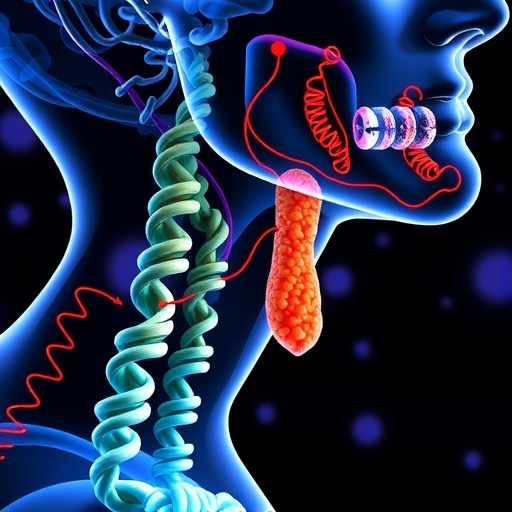In a groundbreaking study published in BMC Cancer, researchers have unveiled new insights into the metabolic underpinnings of thyroid malignancies, employing an advanced gas chromatography-mass spectrometry (GC/MS) approach. This research delves into the complex biochemical landscapes of various thyroid cancer subtypes, promising to revolutionize our understanding and diagnostic capabilities for these heterogeneous diseases.
Thyroid cancer, known for its diverse histological subtypes, poses significant challenges for clinicians due to its varied clinical presentations and outcomes. The intricate biochemical changes that drive these cancers remain only partially understood. However, the recent study spearheaded by Abooshahab, Zarkesh, and Hedayati provides compelling evidence that distinct metabolic fingerprints are associated with each subtype, potentially serving as biomarkers for precise classification.
The study analyzed plasma samples from patients diagnosed with papillary thyroid carcinoma (PTC), follicular thyroid carcinoma (FTC), and medullary thyroid carcinoma (MTC), alongside healthy controls. Through untargeted metabolomics profiling using GC/MS, the researchers identified 61 metabolites across all samples. This comprehensive metabolite profiling highlights significant metabolic reprogramming linked to thyroid malignancy.
Sophisticated statistical models such as partial least squares discriminant analysis (PLS-DA) and its orthogonal variant (OPLS-DA) were employed to discern metabolic differences between groups. The models demonstrated robust separation between cancer subtypes and controls, underscoring the metabolic heterogeneity of thyroid cancers. This analytical rigor strengthens the validity of the findings and opens new avenues for metabolic-based diagnostics.
One of the study’s most striking revelations involves lipid metabolism. Specifically, linolenic acid and arachidonic acid were markedly reduced across all thyroid cancer subtypes, suggesting a shared disruption in fatty acid pathways. These alterations may reflect the tumor cells’ adaptation to sustain rapid proliferation or evade immune responses, offering a biochemical hallmark for malignancy.
Conversely, amino acids such as glutamine and methionine were substantially elevated, especially in FTC and PTC cases. Glutamine, a pivotal nutrient in cancer metabolism, fuels anabolic processes and supports nucleotide synthesis, potentially facilitating tumor growth. Similarly, methionine, implicated in methylation reactions and redox balance, may contribute to epigenetic modifications driving cancer progression.
Moreover, the study found an increase in 2-hydroxybutanoic acid, a metabolite linked to oxidative stress and altered glutathione metabolism. Its elevation suggests heightened cellular stress within tumor microenvironments, offering another layer of insight into thyroid cancer pathophysiology.
Using Random Forest machine learning algorithms, the researchers identified a panel of metabolites—including linolenic acid, linoleic acid, arachidonic acid, methionine, glutamine, and pyruvic acid—that effectively discriminated between thyroid cancer subtypes. This metabolite signature achieved an impressive macro-averaged area under the curve (AUC) of 0.956, highlighting its potential utility in clinical diagnostics.
These findings carry profound implications for thyroid cancer management. By advancing metabolomics-based subtype classification, clinicians can potentially improve diagnostic accuracy, tailor therapeutic strategies, and monitor disease progression with greater precision. The non-invasive nature of plasma sampling further enhances this approach’s clinical feasibility.
Beyond diagnostics, this research sheds light on the metabolic pathways that underlie thyroid cancer development. Disruptions in fatty acid and amino acid metabolism, coupled with oxidative stress markers, illuminate potential targets for therapeutic intervention. Targeting these metabolic vulnerabilities could pave the way for novel treatments that hinder tumor growth or sensitize tumors to existing therapies.
The study exemplifies the power of integrating cutting-edge analytical platforms with bioinformatics tools to unravel cancer complexity. The use of MetaboAnalyst, SIMCA software, and various R packages enabled comprehensive multivariate and univariate analyses, ensuring robust data interpretation and biomarker validation.
Future research directions may include expanding the cohort size and incorporating longitudinal studies to assess metabolic alterations over time and treatment responses. Additionally, validating these metabolomic signatures across diverse populations could modify clinical guidelines and promote personalized medicine in thyroid oncology.
This pioneering work also highlights the broader potential of metabolomics in oncology. As metabolite profiling technologies advance and become more accessible, their application across cancer types can deepen understanding of disease mechanisms and accelerate biomarker discovery.
In conclusion, the study presents a compelling case for metabolomics fingerprinting as a transformative tool in thyroid cancer diagnostics and biomarker research. The identified metabolite alterations not only enable subtype classification but also enrich our comprehension of the molecular drivers of thyroid malignancies, heralding a new era in cancer metabolomics.
Subject of Research: Metabolomic profiling of thyroid cancer subtypes for biomarker discovery and subtype classification.
Article Title: Metabolomics fingerprinting of thyroid malignancies: a GC/MS-based approach for subtype classification and biomarker discovery.
Article References:
Abooshahab, R., Zarkesh, M. & Hedayati, M. Metabolomics fingerprinting of thyroid malignancies: a GC/MS-based approach for subtype classification and biomarker discovery. BMC Cancer 25, 1586 (2025). https://doi.org/10.1186/s12885-025-15073-0
Image Credits: Scienmag.com
DOI: https://doi.org/10.1186/s12885-025-15073-0
Tags: BMC Cancer study on thyroid cancerfollicular thyroid carcinoma biomarkersgas chromatography-mass spectrometryGC/MS metabolomicsmedullary thyroid carcinoma distinct profilesmetabolic profiling of thyroid malignanciesmetabolic reprogramming in cancerpapillary thyroid carcinoma metabolitesstatistical models in cancer researchthyroid cancer biomarkersthyroid cancer subtype classificationuntargeted metabolomics analysis





